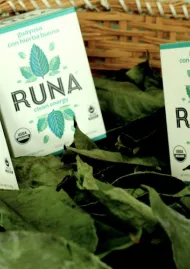Runa Tea
Creating Value in the Amazon

Before the sun rises above the canopy of the Amazon and the night’s mist has lifted, the Kichwa people, an indigenous group in the Ecuadorian Amazon, gather around the fire with their families. As the guayusa leaves boil, they share ancient lore, interpret their dreams and plan the day ahead. The tea, sipped from hollow coconut shells, provides them with the energy needed to perform their daily activities. For thousands of years, the Kichwa people, along with other indigenous groups, have grown and enjoyed guayusa as a way to be “runa,” or fully alive. Having recently graduated from the Yale School of Forestry, Eliot Logan-Hines (‘10) was eager to launch a new project in Latin America. Eliot had heard of a new organization in Ecuador that was building the first guayusa supply chain in the world and seeking an environmental consultant. Intrigued, he traveled to Ecuador in 2010 to visit the small operation called Runa. Eliot was fascinated by guayusa and was convinced of Runa’s potential for profound, long-lasting change.
Recent college graduates Tyler Gage and Dan MacCombie launched Runa in 2009. The supply chain brought guayusa from farmers’ land in the Amazon to tea-drinkers in the U.S. But Tyler and Dan’s vision extended beyond business operations - they wanted to improve the livelihoods of the Kichwa people as well. For this reason, they created the Runa Foundation and asked Eliot to become its Executive Director. Eliot worked to harness guayusa as a tool for economic empowerment, community development and environmental sustainability. Runa’s strong relationship with its 3,000 indigenous farmers had created a positive domino effect—as farmers saw their incomes increase, neighboring farmers would join the initiative, further expanding the organization’s social impact. Eliot was delighted with the Foundation’s work, but wanted to do more. Tyler approached Eliot with a proposal to build a new guayusa factory in Peru and establish a guayusa supply chain in the country. He argued it would benefit Runa LLC, the business, and would enhance the Foundation's impact. Eliot considered the implications of such an expansion. Should the Foundation rely on the business to grow? Would expansion help or harm the Foundation’s relationship with the Kichwa in Ecuador and its commitment to spreading their culture? Could an expansion provide reliable income to vulnerable populations in Peru?